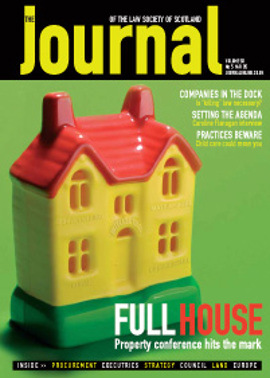Beware the pitfalls

The majority of provisions of the Protection of Children (Scotland) Act 2003 (“the Act”) were brought into effect in January 2005. The Act aims to improve the safeguards for children by preventing unsuitable people from working with them. A “child” is defined as “a person under the age of 18”.
The Act allows Scottish Ministers to set up the Disqualified from Working with Children List, which came into operation on 10 January 2005. At first blush, the Act does not appear to be of direct relevance to the average solicitor. A closer inspection, however, reveals that there are many pitfalls for all solicitors in private practice and that there are areas in which the Society may have to produce guidelines and regulations to ensure that the profession complies with the Act and its aims.
In broad terms, the Act requires Scottish Ministers to keep a list of individuals considered unsuitable to work with children. Since 10 January 2005, someone who is disqualified commits an offence if they apply to work in a childcare position (paid or unpaid) or continue to work in such a position having been disqualified. Organisations are required to refer individuals to the Executive in certain circumstances where a child protection issue arises. Those individuals included in the list are disqualified from working with children. From 11 April 2005, if an organisation offers work in a childcare position to an individual on the list or procures such work for an individual, the organisation is guilty of an offence. Similarly, an offence is committed if an organisation fails to remove a disqualified individual from a childcare position.
The Society has obtained advice on the extent to which the Act affects solicitors in practice. The advice is that legal practices generally fall within the definition of “organisation”. All practices should therefore be aware of the implications of the Act when employing individuals within the office.
Employment in breach
The mischief addressed by the Act is in allowing persons disqualified from working with children to assume “normal duties” which may involve being “in sole charge of” a child or having “unsupervised contact” with a child. When a firm employs a new solicitor (or indeed any other member of staff who may work with children), that firm would commit an offence if that solicitor or member of staff is on the disqualified list and will be in a position in which his or her normal duties involve taking instructions from a child when that child is unsupervised.
An organisation which offers work in a childcare position to an individual who is disqualified from working with children, or which fails to remove an individual who is disqualified from such work, will commit an offence in terms of section 11(3) of the Act. A “childcare position” is defined in schedule 2, paragraph 1. This includes a position: “(d) whose normal duties include caring for, training, supervising or being in sole charge of children”.
The Act does not define “being in sole charge of children”. The Act is a penal statute. It should therefore be construed strictly, but consideration will of course be given to the mischief at which the Act was aimed. A court asked to interpret the phrase may well consider whether the normal duties are such that an employer could reasonably expect the employee to have the opportunity for abuse of children. If an employed person finds himself or herself in sole charge of a child, that does not in itself mean that his or her employers may have committed an offence. The difficulty arises where a person’s normal duties include being in sole charge of a child. For instance, therefore, if a firm advertised for a child law specialist and then employed a disqualified person in such a position, there would potentially be an offence.
Defence agents too
The provisions of paragraph 1(d) are likely to affect family law practitioners who reasonably expect their normal duties to include taking instructions from children. The effects of the Act are much wider reaching, however. As noted above the Act defines a child as “a person under the age of 18”. In other words, a practitioner who represents clients in summary criminal business may well fall within paragraph 1(d) if he or she is regularly engaged by 16 or 17 year old children. In the circumstances, it is important that organisations are clear about the “normal duties” of employees. A critical distinction will have to be drawn between employment in work where there is a possibility of an occasional task where a solicitor is in sole charge of a child, and employment where normal duties involve being in sole charge.
Schedule 2, paragraph 1(e) to the Act further provides that a childcare position is a position: “(e) whose normal duties involve unsupervised contact with children under arrangements made by a responsible person”.
“Responsible persons” include parents or guardians of the child, and certain others who may have responsibility for care of the child, such as persons over 18 with whom the child lives or the managers of an establishment in which the child is accommodated for purposes inter alia of education or care.
The language of the Act is convoluted at this stage. The aim appears to be that a disqualified person should not be employed in a position where normal duties involve contact with children arranged by a responsible person unless the contact takes place in the presence of a person who falls within the list of “responsible persons” or is a childcare worker. Again, practices should bear in mind that the Act is directed at “normal duties” and an occasional interview with a child will probably not bring a solicitor’s role within the definition of “childcare position”. However a precognition agent employed by a practice which regularly defends accused persons under 18 could be within it.
Guidance and advice
The Society is considering guidelines to assist members so that solicitors will not fall foul of the provisions of the Act. Until some parts of the Act are clarified, that guidance may have to be along fairly conservative lines and construing the Act strictly.
Solicitors who are involved in preparing childcare reports for the court may well be “in sole charge of” or having “unsupervised contact” with a child, depending on circumstances. The advice that the Society has received considers whether such reports would be within a solicitor’s “normal duties”. The advice is that if a solicitor is a member of the panel of curators ad litem and safeguarders then that solicitor has clearly undertaken “normal duties” involving interviewing children. Such solicitors should certainly not be employed to prepare reports if they are on the disqualified list.
In interpreting the Act, there will be questions of fact and degree to be taken into consideration. In broad terms at this stage, however, there is a good case for ensuring that solicitors and other staff who are engaged in work involving children are not disqualified from undertaking childcare positions in terms of the Act, and firms should consider carefully their employment procedures with immediate effect.
The Scottish Executive has produced booklets with guidance for organisations and for individuals, which can be found on their website www.scotland.gov.uk, or obtained from Blackwell’s Bookshop, Edinburgh (0131 622 8283 or business.edinburgh@blackwell.co.uk).
Caroline Flanagan is an accredited family law specialist and President Elect of the Law Society of Scotland.
In this issue
- Leaving on a high
- The JAB: why it isn't working
- One house, many rooms
- Bad company
- Tender and true
- Beware the pitfalls
- Alien investors in the US
- Budgeting and beyond
- Let's play tag
- Same old story
- Getting the message across
- Council life
- Should the party pay?
- Unintended effects?
- A fine Profile
- Public benefit?
- The appeal of leave
- When is a cost not an expense?
- Website reviews
- Book reviews
- What a waste!
- How safe are your titles?






